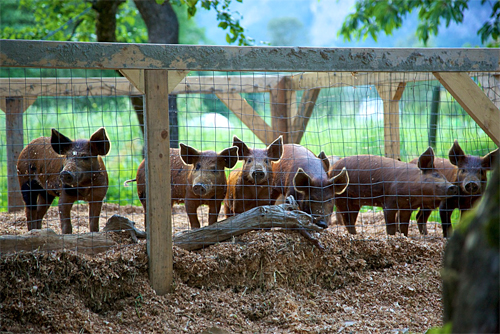“There are people in another country who are turning their ideas into practical actions,” said Annabelle Dolidon, a professor of French at Portland State.
The green mind

“There are people in another country who are turning their ideas into practical actions,” said Annabelle Dolidon, a professor of French at Portland State.
A Canadian sustainability documentary directed by Linda Desormeaux and titled A l’an vert—which translates to The Green Mind in English—will celebrate its U.S. premiere at PSU Thursday in Lincoln Hall.
“By making this film, I was hoping to inspire people, to encourage them to make even a tiny change in their habits that would contribute to making this planet a better place to live in,” Desormeaux said.
A l’an vert follows four people who change how they live their lives out of concern for the environment.
“They’re all trying to become self-sufficient…through things like building a community or growing their own food,” Desormeaux said. “They haven’t attained self-sufficiency yet, but that’s their quest.”
The film is in French and was aired for the first time on Canadian television last Sunday to commemorate Earth Day. When Dolidon first contacted Desormeaux, the film crew was still in the process of editing the film. They have added English subtitles specifically for the PSU screening.
The screening is sponsored by the Canadian studies department, the French department and the Alliance Française, which will be providing a small buffet of bread, cheese and wine beforehand.
Afterward there will be a discussion with Desormeaux. And Friday there will be a second discussion in the Finnish Room of Cramer Hall.
Each of the four people featured in the documentary are trying to reach self-sufficiency in different ways. Two live in an urban setting and two live in the country.
Myriam Parent lives in a collective in Vancouver, Canada, where the people she lives with share a bank account and treat each other like family. Peter Endisch grows food in his home in a suburb of Vancouver, with plants filling his yard and covering his fences and walls.
“He also wants to share the fruits of his labor with his community,” Desormeaux explained. “He wants to inspire his community to do the same thing he’s doing.”
Nicole Leduc lives in a community called OUR Ecovillage, where about 20 people try to live off the land by farming together.
Corine Singfield lives in Bella Coola Valley, a remote town that she hopes can become sustainable. She supports and advocates Community Supported Agriculture programs, where people buy shares of farmers’ crops to encourage them to keep farming.
Desormeaux has been working in documentary filmmaking for more than 10 years, but became particularly interested in sustainability about five years ago. With Canada facing an economic crisis and increasing worries about globalization and oil dependence, she began to become concerned herself.
“I became afraid because I wasn’t sure how we would survive as a species, so I decided to look into the possibility of moving to the country to become more self-sufficient,” Desormeaux said. “At that time, I wasn’t the only one feeling this way. There was a big movement, especially here in British Columbia.”
Desormeaux didn’t end up staying in the country, but when she returned she decided to more actively fight for the environment. She joined organizations that were fighting environmentally damaging policies, such as the transportation of crude oil.
Right now, companies are trying to extract oil from the Alberta tar sands. The process wastes more energy than it creates and emits a large amount of carbon dioxide. There are also many power companies that try to use the Canadian rivers for energy, but they do so in ways that damage the ecosystem.
“It’s our new-era gold rush,” Desormeaux said. “When I came back, I decided that I would face my fear by becoming an activist.”
Dolidon thinks that this documentary is perfect for the PSU audience.
“Universities are about ideas, but PSU is about actions as well. It’s serving the city,” Dolidon said. “This event shows how you can turn your ideas into practical actions.”
The film focuses on small things you can do to change your everyday lifestyle in order to help the environment. While the people in the documentary don’t protest in the streets, they still make a difference through practical smaller-scale changes.
“I hear that Portland is always so progressive, and it seems to me like it’s a very environmentally-minded town,” Desormeaux said.
“This movie fits really well with the public in Portland, because this is something that Portlanders and PSU students cherish, this idea that little by little you can make the world better without necessarily having huge ideas,” Dolidon added.
“I’m hoping that in some way that people will see the documentary as a gentle call to action,” Desormeaux said. “And I hope they will realize that it’s actually fun to work toward community-based and agricultural-based society, more than working toward corporate-based society.”
The U.S. premiere of A l’an vert With director Linda Desormeaux
Screening: Thursday, May 3, 7 p.m. in Lincoln Hall, room 75
Discussion: Friday, May 4, 2 p.m. in Cramer Hall, Finnish Room
Free and open to the public




